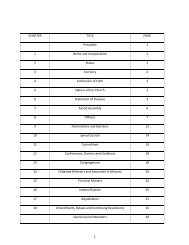Call Process Booklet
Call Process Booklet EDITED - Northwest Synod of Wisconsin
Call Process Booklet EDITED - Northwest Synod of Wisconsin
- No tags were found...
Create successful ePaper yourself
Turn your PDF publications into a flip-book with our unique Google optimized e-Paper software.
Theological Background<br />
Adapted from the St. Paul Area Synod<br />
At the heart of our Lutheran theology is something Martin Luther termed “the<br />
priesthood of all believers.” In our baptism God has called us all to be part of the body<br />
of Christ. Luther reminded us of the Latin origin of the word “vocation”—vocare—which<br />
means “to call.” All of us take up our vocations—our callings—as God’s people. We are<br />
all ministers in whatever daily activity is ours. Within this priesthood of all believers there<br />
exists the ordained office of ministry, the “office of Word and Sacrament” (see Augsburg<br />
Confession below).<br />
God’s<br />
work.<br />
Our<br />
hands.<br />
On the basis of our Lutheran theology, a pastor is called, not hired, to serve a<br />
congregation. The call process is not the same as the hiring process in other parts of<br />
society. Any process that seems to focus on “head hunting,” resume shuffling, or high<br />
anxiety interviews is missing the point in the calling of a pastor. A call is one element in<br />
the church’s seeking and following God’s movement into the future.<br />
The call process is not a pageant, in which contestants present themselves to their best<br />
advantage so they will be the winners. The Lutheran call process is unique because it is<br />
an effort to discern what God wants for the local congregation and for the whole church<br />
in order that the Gospel may be proclaimed and the sacraments administered in<br />
accordance with the Gospel.<br />
In order for a call to be issued there must be first a congregational vote for the<br />
candidate. Second the president and secretary of the congregation, representing the<br />
congregation’s decision, must sign the Letter of <strong>Call</strong>. And finally, the Bishop,<br />
representing the whole church, must sign the Letter of <strong>Call</strong>.<br />
What the Augsburg Confession Says<br />
The Lutheran Church looks to the documents called “The Lutheran Confessions” for its<br />
understanding of scripture, the faith and the church. Chief among these documents is<br />
the Augsburg Confession, adopted by the reformers in the city of Augsburg (Germany)<br />
in 1530. These short, concise statements help us understand the nature of the office of<br />
ministry in the Lutheran Church:<br />
“We cannot obtain forgiveness of sin and righteousness before God by our own merits,<br />
works, or satisfactions. We receive forgiveness of sin and become righteous before God<br />
by grace, for Christ’s sake, through faith, when we believe that Christ suffered for us<br />
and that for his sake our sin is forgiven and righteousness and eternal life are given to<br />
us.”<br />
Article IV, The Augsburg Confession (AC)<br />
Walking together † for the sake of mission † in God’s world<br />
944 24 ¼ Street • PO Box 107 • Chetek, WI 54728 • 715-859-6810 • Fax 715-859-6812 • www.nwswi.org<br />
Page 3




